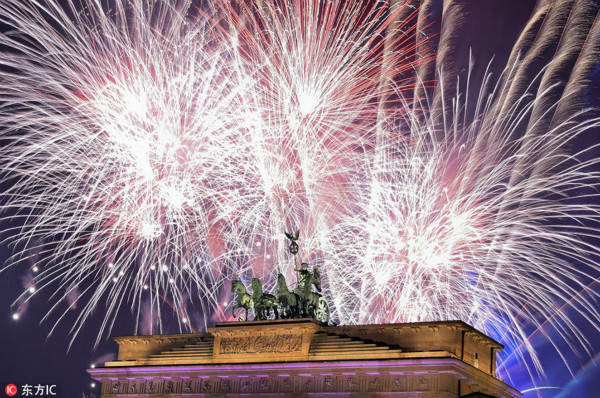 |
|
View of the Brandenburg Gate during the fireworks display on New Year's Eve in Berlin Germany, January 1, 2017. [Photo/IC] |
On New Year's Eve, one of my best friends sent me an emotional text message saying she was lucky to have taken off from Brussels International Airport in the early hours of March 22, just a few hours before the terrorist attacks at the airport and Maalbeek metro station in central Brussels. She wished us all the best for the New Year.
The bombs on the metro exploded during the morning rush hour just 500 meters from my office and only two stops from my home. My son had taken the metro on the fateful route that morning but luckily he got off one stop before Maalbeek to go to school.
My friend's good wishes touched my heart and I realized my loved ones escaped the disasters in the past year but many people did not. Her message also reminded me of the end of 2015, when I wrote that I hoped Europe would make a New Year's resolution to become safer and China would do the same to become greener. Needless to say my wish was not fully realized.
Paris staged a dazzling New Year Eve's fireworks display, and the media called the people who stood in the streets in chilly weather to welcome the New Year as "brave soldiers" because of the terror attacks in France in the recent past.
In December, Europe's anti-terrorism authorities said dozens of Islamic State group members were in Europe. Terrorists have especially targeted European countries that have joined the United States in the fight against the IS group, and terrorist attacks in Europe have sharply increased.
The New Year Eve nightclub attack in Istanbul, Turkey, and the horrifying incident in the Berlin Christmas market show that terror attacks are indeed on the rise.
Despite all this, I welcomed 2017 with a two-year-old wish: a safer Europe and a greener China.
In her New Year message, UK Prime Minister Theresa May focused on making the exit from the European Union smooth. French President Francois Hollande warned against the risks of rising nationalism. And German Chancellor Angela Merkel said she was shocked to know that some of the people her country had helped were involved in the recent terrorist attacks.
Since the two main economic forces of the EU, France and Germany, go to the polls this year, there is a risk that leadership changes in the two countries could slow the process of meeting the challenges ahead. However, the importance of preventing terrorist attacks should not be understated.
Such attacks have not only caused deaths and destruction, but also damaged the economies of some EU countries at a time when Europe is yet to fully recover one of the worst financial crises. For example, the latest figures show the terror attacks in Belgium and France have hit Belgium's economy. Belgium's GDP growth dropped by 0.1 percent in the first quarter of 2016 because of the March 22 attacks, according to Jan Smets, governor of the country's national bank.
Europeans should also realize that rooting out terrorism from the continent depends on how they deal with the war-torn regions. The EU has been making increasing investments in neighboring regions, which will help create jobs. But the West is yet to shoulder its share of the global responsibility in a changing world.
It seems the EU, the largest development donor in the world, has done half right and half wrong in this regard. Some regional conflicts, which have been going on for years, have become more complicated and intense because of the involvement of the US.
Many have criticized outgoing US President Barack Obama for tacitly, if not overtly, supporting the "Arab Spring", saying it is responsible for the hopeless situation in the Middle East today. Had the EU dealt with these developments with more sensitivity and less military intervention, the situation could have been different and its challenge list for 2017 would be shorter.
The author is deputy chief of China Daily European Bureau. fujing@chinadaily.com.cn

The year 2016 marks my second time saying farewell to full-time motherhood and back to "normal".